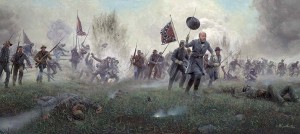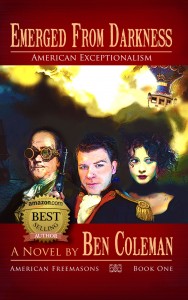Men with sallow faces stare grimly across the battlefield, each lost in his own thoughts. It is the 3rd Day at Gettysburg.
 A weariness clings to their bones, exhaustion to their bodies. Each man clutches his rifle as a silent tension drifts across the tall grass, shimmering with the summer’s heat. Some eat or drink while they can, absently lifting a piece of hardtack, or canteen of water to their lips. But their eyes do not yield the gaze that lay upon the enemy’s position across the way.
A weariness clings to their bones, exhaustion to their bodies. Each man clutches his rifle as a silent tension drifts across the tall grass, shimmering with the summer’s heat. Some eat or drink while they can, absently lifting a piece of hardtack, or canteen of water to their lips. But their eyes do not yield the gaze that lay upon the enemy’s position across the way.
Today is the day. Today it will be finished.
Everyone knows it, they feel it in the air. It is a thing to which every soldier can testify, but few can adequately describe. But it is real, the sense, the intuitive understanding, the subliminal reading of the field, and tides of battles ebb and flow upon it. It is a nameless skill one learns to acquire after countless exposures to death and time spent in the reapers company.
Thousands of men and boys have already gone in only two days. Thousands more will go today, to muster in at roll call, in that forever twilight place.
It is an open secret for all men, both North and South, that Lee will hit the Union center. For two days relentlessly he has struck the Federal line, her flanks both right and left. He knows each one has been reinforced. There is only one place left upon which the inevitable rebel blow can fall. Lee believes it is the weakest link, the place from which those reinforcements were drawn and not replaced. But it lies across a mile of open ground, and a daunting task awaits them, those to whom it falls, to cross the long and lonely swales of grass.
Ultimately the silence is lifted as a singular bombardment begins. And it is upon the hour of one in the afternoon.
One hundred and fifty Southern guns open fire on the center of the Federal line, and Yankee guns respond. It is the mightiest duel of titans thundering across the heavens ever heard in North America. The cannons roar of fury it is said, is heard as far as Philadelphia, and even distant Baltimore. For more than an hour these giants rend the skies and rain upon the enemy with fire, until finally they simply stop.
A single man in gray then rides ahead, breaking out just along the tree line of the Confederate center position. And he calls out cleanly, with the patriots courageous timbre.
“MEN! UP AND TO YOUR POSTS!”
And as one, many thousands rise.
The man is General George Pickett, a loyal dandy of old Virginia, and close acquaintance of Abraham Lincoln.
His black coiffured hair falls in scented and oiled ringlets below his officer’s cap. But his is no timid soul. It is the very soul of the tempest of Southern martial defiance, and gloried heroic past.
And the honor is his to tell the divisions.
Their time has finally come and today they step into history and the sacred pages of books.
They will strike the Union line and break it.
And upon their valorous marches end, independence will be their prize. And every name shall be cloaked in glory, forever.
Fifteen thousand men step off, impeccably and pristine as one.
Of America, if they say, the North be her brilliant mind, it is with the South where lies her vanity.
And it is a scene which has never been rivaled before or since in the history of an American people. It is and was according to the Union eyes which observed it a thing of hush and awe.
“Every eye could see his legions, an overwhelming, relentless tide of an ocean of armed men sweeping upon us! Right on they move, as with one soul, in perfect order, without impediment of ditch, or wall or stream, over ridge and slope, through orchard and meadow, and cornfield, magnificent, grim, and irresistible.”
Inevitably the Union guns open up with gushing angry flame and the terror of shot and shell begins its terrible and fiery reign. Bloody ripping wounds tear gashes in the rebel line. But they do not stop, and with admirable, and noble discipline their lines are dressed and sealed up.
And still they come, marching, with determined, insoluble stride.
Even the enemy admits to admire them with sincerest humble form, and they plainly marvel at the discipline of the men, and the honor of those who lead them.
They are leading and marching with them, bravely into deaths abyssal maw. But not a step is missed, nor hesitant, nor lost. And invariably they march toward the distant Union stone wall.
And none but they who walk it believe they will truly make it, except for the author of their orchestration, General Lee.
The words of General Longstreet himself state the order was obeyed in protest, for all its futile glory. He doesn’t believe they can make it. And he has told General Lee exactly so.
He says that he has personally led men in squads, platoons, companies, regiments, and division, and that no fifteen thousand men ever created could take that distant stone wall. And it is evident he remains unbelieving of Robert E. Lee’s grand design.
And while it is unnecessary to describe the slaughter in detail which took place there. It is a testament to the fighting quality and tenacity of the American soldier that they made it.
The fingertips of the Confederate soldiers touched the impossible.
For across a mile of open ground, beneath a hail storm of shot and shell they marched, until the violent wasp like ripping of bullets joined them.
And still they came on.
At point blank range cannon shot tore gaping and raw boned bloody holes in their ranks, and still they closed those ranks up. Bodies were thrown asunder, littering the red green ground in careless piles, in pieces and in whole.
And still the rebels came on.
Through flaming sheets of musketry erupting right in front of them, they kept coming, and by the hundreds in seconds they fell.
But still they wouldn’t stop.
And the rebels hit the stone wall.
And breached it.
Up and over they went and hand to hand fighting commenced.
Disciplined formations of Union men and Rebel enemies collided.
Order descended into chaos.
And for timeless moments the momentous decision was in the air.
But inevitably, or tragically, or perhaps even both, Northern reinforcements prevailed, and threw back the tide.
And a Confederate victory was not to be this day.
In the end as the tide of temporary fury of battle fled them, the Union defenders let them go, and they simply watched, with dawning relief, gripping fatigue, and latent humanity.
Those that could, helped those who couldn’t, and the rebel swell washed slowly back.
Ultimately and in the end Pickett’s Charge was not the only battle or clash which took place at Gettysburg that day, but it was unarguably the grandest, before that day or since.
The Battle of Gettysburg was decided, and Lee’s myth of invincibility was broken. But so also was one more Union Commander vanquished. For Meade was again hesitant, despite the demand of Lincoln he did not pursue the Confederate Army. He let it go, to recross a river, and return to the relative safety of home territory, to recuperate its losses as best it could.
And precisely as Lincoln feared it rearmed.
And the Army of Northern Virginia under Lees indomitable command would fight on for nearly two more years.
And in the minds and hearts of his men he never lost confidence or favor.
For in the most secret of moments of every southern man and boy, they could always return to that singular moment in time just before they stepped off at Pickett’s Charge.
The final cost of the butcher’s bill for those three days at Gettysburg
An estimated 55,000 Americans dead, wounded, or missing.


